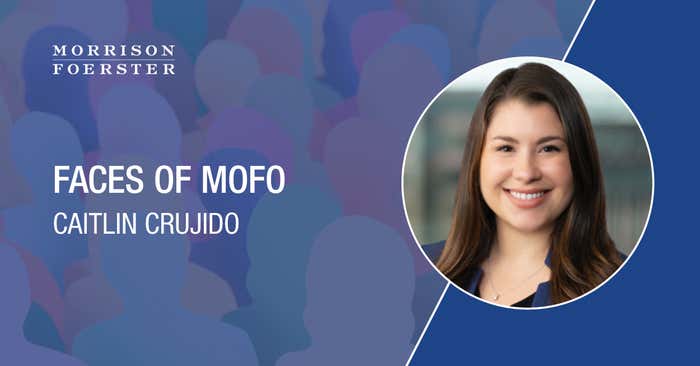
Editors’ Note: As part of our ongoing Faces of MoFo series, Caitlin Crujido, an associate in the firm’s Government Contracts practice, discusses her career path and what led her to call MoFo home.
Like others featured in Faces of MoFo, I had a somewhat unconventional and unexpected journey to MoFo. I don’t remember feeling like I was destined to become a lawyer and, once I decided to go to law school, I didn’t go with the intention of practicing government contracts.
Growing up, my family moved around every few years: California to Illinois to Arizona to Maryland and back to Arizona. Despite all of these moves, I consider Arizona my home. I spent the majority of my formative years in Prescott, a small mountain town in Northern Arizona, home to the world’s oldest rodeo and Arizona’s oldest saloon. As much as I loved growing up in Prescott, I always knew I’d leave. After high school, I went to the University of Arizona, where I majored in political science and quickly immersed myself in all things politics. Over the course of a few semesters, I interned for my congressional representative, campaigned for candidates throughout Southern Arizona during a contentious midterm election, and volunteered with Organizing for America.
During one of those semesters, I took a Chicano studies class. The course provided an overview of a history that, to my knowledge, had not been disclosed completely despite years of American history and civil rights lessons. I found this both surprising, considering I grew up in the Southwest, and disappointing because I was deprived of a history I felt entitled to. I learned that earlier in the year, the Arizona state legislature passed a bill prohibiting public schools from teaching ethnic studies courses. This bill targeted a popular high school program, known as Raza studies, that provided the predominately Mexican American student body with courses designed to teach them about their ancestral and cultural history. My utter disbelief that this piece of legislation could unravel a program proven to increase graduation rates, together with what felt like a logical next step given my major, led me to consider attending law school.
After graduation, I moved to Phoenix and began working at a small law firm as a paralegal. There are no lawyers in my family and I needed to make sure a legal career was something I wanted. Fortunately, I had the privilege of working with some wonderful attorneys who provided lot of guidance and a lot of support. After two years, I left Arizona for law school in Washington, D.C.
During law school, I grappled with the type of law I wanted to practice. It wasn’t until my 2L summer that I stumbled into government contracts. I interned with the Civilian Board of Contract Appeals (CBCA) and became intrigued by the subject matter of the cases. I continued to explore government contracts during my 3L year, working for a law firm in their government contracts practice group. By then, I was hooked and returned to the CBCA following graduation for a year-long clerkship.
 When it came time to interviewing with law firms, I looked for a few things: a top-tier, tightknit government contracts practice group, a commitment to diversity and inclusion, and an active pro bono practice. MoFo ticked all of those boxes and more. Having just hit my two-year anniversary with MoFo, I am reminded of how much I’ve learned from my colleagues, the opportunities I’ve had to work with clients from all over the world, and the fascinating matters I’ve had the privilege of litigating.
When it came time to interviewing with law firms, I looked for a few things: a top-tier, tightknit government contracts practice group, a commitment to diversity and inclusion, and an active pro bono practice. MoFo ticked all of those boxes and more. Having just hit my two-year anniversary with MoFo, I am reminded of how much I’ve learned from my colleagues, the opportunities I’ve had to work with clients from all over the world, and the fascinating matters I’ve had the privilege of litigating.
I am also incredibly proud of my pro bono work, particularly our most recent challenge to the U.S. Department of Education’s Title IX regulations. I appreciate that MoFo consistently encourages its attorneys to engage in pro bono efforts because, as the late Supreme Court Justice Ruth Bader Ginsburg once said, “If you want to be a true professional, you will do something outside yourself, something to repair tears in your community, something to make life a little better for people less fortunate than you.”